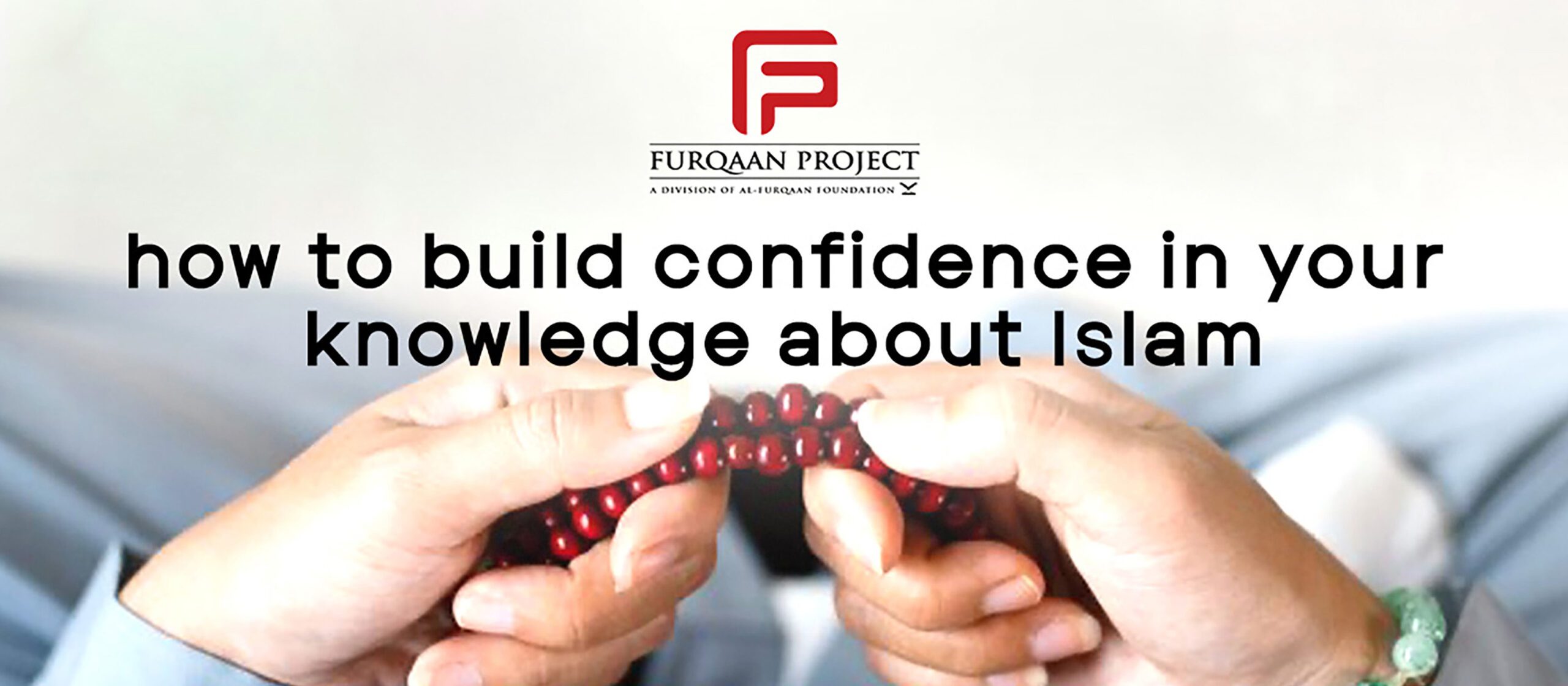
Imagine this situation: you’re in an Islamic environment, whether it’s a meeting in your Muslim Student Association (MSA) club, or you’re out on the streets doing dawah to the people. All of a sudden, you’re asked a question that you’ve never been asked before about your faith. You start to feel a little nervous because you don’t know how to answer. That nervousness quickly turns into the feeling of being overwhelmed because you realize that you have zero knowledge about the subject that the question is about. Sometimes that overwhelming feeling can turn into frustration because you don’t have an answer right then and there for the seeker of knowledge. Finally, sometimes a person will begin to question whether or not they’re even a devout Muslim because they don’t have knowledge about everything in their faith.
We have all been in such a situation. Some use those moments to dig deeper into their faith, and others become tempted to avoid that particular subject altogether. The hesitation that comes from the latter slowly starts to create a distance from one’s faith, not because of disbelief, but because of fear—fear of being questioned, fear of not knowing enough, and fear of judgment.
However, what if we reframed that fear? What if we saw those moments not as challenges but as opportunities? Opportunities to strengthen our relationship with our Creator, grow as individuals, and become more grounded in the beauty of what we believe in. In Islam, seeking knowledge is a noble pursuit, and engaging with questions—whether they come from others or ourselves—is an empowering way to nurture confidence in our faith.
In this article, we will discuss how to approach your new journey of faith and seeking knowledge with confidence. We’ll look at the importance of being a seeker of knowledge, share practical steps on building a stronger foundation to your faith, and highlighting excellent resources that you can use to make the journey easier and more powerful. This article is fit for both Muslims and non-Muslims because seeking knowledge, as shown in Islam, is incumbent upon every soul.
Remember, it is okay to feel this way
Let’s start with an important truth: it’s natural to feel unsure or even intimidated when faced with questions about your faith. Many of us, particularly in our younger years, have felt that hesitation, that moment of doubt when we wish we had the perfect answer to give but didn’t. These moments can be humbling, but they are also universal. You are not alone in feeling this way.
What matters is how you respond.
The greatest story that we can refer to and learn valuable lessons from is the story of Salman al-Farisi, the companion of our Prophet (SAW). His journey to Islam is one of the most extraordinary examples of seeking knowledge to understand the faith better. He was born in Persia, modern day Iran, into a Zoroastrian family. His father was deeply devoted to their religious practices and expected Salman to follow the same path. However, Salman’s path was restless, and he felt that the truth lay elsewhere.
One day, Salman encountered a group of Christians and was struck by their teachings. Their faith seemed closer to the truth than what he was exposed to growing up. Driven by his curiosity, he left his home in search of Christianity. This quest for the truth allowed him to meet with many scholars and he traveled to several cities, learning and absorbing whatever he could from all of them. Eventually, one of his Christian teachers informed him that the time had come for the arrival of a new Prophet in the land of Arabia. He would bring the final revelation from Allah (SWT).
Determination sparked within Salman. He quickly set off for Arabia, but this journey brought him many hardships, including being sold into slavery, but his resilience never wavered. When he finally met our Prophet Muhammad (SAW), he was able to immediately recognize him. Soon after, Salman accepted Islam. He didn’t know much about Islam first, he went through two different faiths and many trials to finally find the path of Allah (SWT), but he never left his thirst for knowledge unquenched. Eventually, his knowledge and intellect became so sharp that it was he who suggested building the trench during the Battle of Khandaq—a strategy which would only lead into the greatest battle victory.
Is it important to seek knowledge in Islam?
In short, the answer is yes. Islam places immense value on the seeking of knowledge. Allah (SWT) could have chosen any command to give to the Prophet (SAW) at the start of the revelations; however, the most essential command which would set the foundation for the entire was one word: iqra. Read. Ali ibn Abu Talib, the cousin and son-in-law of the Prophet (SAW) himself states, “A person setting forth for the acquisition of knowledge is like the one who struggles in the way of Allah.”
Further, in a famous hadith the Prophet (SAW) says, “Seeking knowledge is an obligation upon every Muslim.” In our masajid, in Islamic history, and even within our families we see a number of individuals who have dedicated their entire lives to learning more about Islam. When we begin to understand the basics of Islam, it becomes easier for us to answer certain questions that may appear difficult to answer.
How do we develop confidence in our faith?
- Always start with the basics: begin with what you already know. Many people might say that they already know the basics of our religion, but we should actually try to master the basic concepts so we can build a strong foundation. Revise how much you actually know about the pillars of our faith, what questions you still have, where can you go to seek out those answers, etc. Once this is done, we can move to the next step.
- Learning how to navigate doubts: do not be frustrated. Doubts are meant to occur and you are meant to ask questions so you can grow as an individual. When we were children, our teachers would frequently pause lectures and lessons to ask us if we had any questions. If no students had questions, the teacher would become concerned because they wouldn’t know if we are actually retaining that information, or if we are disengaged. Face these doubts with sincerity and curiosity. When you address these doubts head-on, you build a deeper and meaningful connection with your faith.
- Ask your questions without any fears: every question is a valuable question. They are actually a sign of humility. Don’t hesitate to seek guidance from knowledgeable individuals or trusted sources. Surround yourself with people who encourage open and respectful discussions about faith.
What are the best tools for seeking knowledge?
- The Quran: the best resource in this entire religion to become more connected with Islam is none other than the very book that holds all the answers to your questions; however, with a difficult translation, your journey can become a bit more challenging. Grab a copy of The Clear Quran® translation which is authored by Dr. Mustafa Khattab, and is renowned for being the easiest translation to understand by both Muslims and non-Muslims alike! What’s even better is that if you continue to have doubts about certain verses in The Quran, the translation also has footnotes that clear up those doubts!
- Hadith collections: in addition to studying The Quran, you must also study the hadith as well so you are able to further understand valuable lessons that can benefit you in your journey. Visit furqaanbookstore.com to grab hadith collection sets, or visit sunnah.com for a digital collection of the ahadith.
- Qualified teachers and scholars: the Imams in masajid are not there just to give sermons and lead prayers. They are at the service of the community to also answer any questions that you may have! You can also follow scholars/learned teachers like Dr. Yasir Qadhi, Imam Omar Suleiman, Imam Suhaib Webb, and Dr. Katherine Bullock.
- Local community resources: active dawah organizations such as The Clear Islam are always at the ready for answering any and all questions relating to religion. Simply visit their website and reach out to their hotline with any questions you have.
Once you have the knowledge, apply it to your daily lifestyle
Reading Islamic literature is something that anyone can do, but real knowledge is only consumed when it is implemented. Strengthen your prayer, increase your remembrance of Allah (SWT), and allow your faith to guide your interactions with others. Confidence grows when Islam becomes a living, breathing part of your daily routine.
Every time you learn something new, think about how you can incorporate it into your life. For example, if you study about gratitude in Islam, practice it by actively thanking Allah (SWT), and those around you. The more you apply what you learn, the more confident you’ll feel in your faith.
Remember, building confidence isn’t something that will happen overnight. This will become a lifelong journey for you. Even the most knowledgeable scholars were once beginners, taking their first steps towards understanding. Every step you take, no matter small, is meaningful and valuable. The goal here is not to know everything as fast as possible. It is to sincerely seek knowledge for Allah (SWT). Trust in the One who has all the answers of this dunya. Stay connected to your community, implement Islam’s teachings and the Sunnah into your life, these two things will only strengthen your knowledge and allow you to lead others by example.
Begin your journey today with this verse of The Quran, “Read, O Prophet, in the Name of your Lord Who created (The Clear Quran®, 96:1).”



